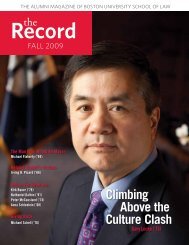the nature of representation: the cherokee right ... - Boston University
the nature of representation: the cherokee right ... - Boston University
the nature of representation: the cherokee right ... - Boston University
Create successful ePaper yourself
Turn your PDF publications into a flip-book with our unique Google optimized e-Paper software.
2005] THE NATURE OF REPRESENTATION 147<br />
The Fourteenth Amendment partially undid <strong>the</strong> Constitution’s discriminatory<br />
system <strong>of</strong> House <strong>representation</strong>. Amendment XIV, § 2 <strong>of</strong> <strong>the</strong> Constitution reads:<br />
Representatives shall be apportioned among <strong>the</strong> several States according to<br />
<strong>the</strong>ir respective numbers, counting <strong>the</strong> whole number <strong>of</strong> persons in each State,<br />
excluding Indians not taxed. But when <strong>the</strong> <strong>right</strong> to vote at any election for <strong>the</strong><br />
choice <strong>of</strong> electors for President and Vice President <strong>of</strong> <strong>the</strong> United States,<br />
Representatives in Congress, <strong>the</strong> Executive and Judicial <strong>of</strong>ficers <strong>of</strong> a State, or<br />
<strong>the</strong> members <strong>of</strong> <strong>the</strong> Legislature <strong>the</strong>re<strong>of</strong>, is denied to any <strong>of</strong> <strong>the</strong> male inhabitants<br />
<strong>of</strong> such State, being twenty-one years <strong>of</strong> age, and citizens <strong>of</strong> <strong>the</strong> United States,<br />
or in any way abridged, except for participation in rebellion, or o<strong>the</strong>r crime,<br />
<strong>the</strong> basis <strong>of</strong> <strong>representation</strong> <strong>the</strong>rein shall be reduced in <strong>the</strong> proportion which <strong>the</strong><br />
number <strong>of</strong> such male citizens shall bear to <strong>the</strong> whole number <strong>of</strong> male citizens<br />
twenty-one years <strong>of</strong> age in such State.<br />
Thus, while African-Americans became “whole” persons under <strong>the</strong> Constitution,<br />
Indians were still excluded. Critically for <strong>the</strong> Cherokee super-vote, denying or “in<br />
any way” abridging a male inhabitant “<strong>the</strong> <strong>right</strong> to vote at any election for <strong>the</strong><br />
choice <strong>of</strong> . . . Representatives in Congress,” proportionately reduces <strong>the</strong> basis <strong>of</strong><br />
<strong>representation</strong>. Because restricting <strong>the</strong> class <strong>of</strong> persons who can vote for <strong>the</strong><br />
Cherokee delegate to Cherokees does not fall into <strong>the</strong> exceptions for participation in<br />
rebellion, or o<strong>the</strong>r crime enumerated in <strong>the</strong> Amendment, Oklahoma’s basis for<br />
<strong>representation</strong> should decrease by this section.<br />
The Constitution prohibits abridgment or denial <strong>of</strong> <strong>the</strong> <strong>right</strong> to vote according to<br />
specific classifications. Section One <strong>of</strong> <strong>the</strong> Fifteenth Amendment reads: “The <strong>right</strong><br />
<strong>of</strong> citizens <strong>of</strong> <strong>the</strong> United States to vote shall not be denied or abridged by <strong>the</strong><br />
United States or by any State on account <strong>of</strong> race, color, or previous condition <strong>of</strong><br />
servitude.” The Nineteenth Amendment expands this to include denial on <strong>the</strong><br />
basis <strong>of</strong> sex and <strong>the</strong> Twenty-Sixth Amendment does <strong>the</strong> same on <strong>the</strong> basis <strong>of</strong> age.<br />
The Fifteenth Amendment’s prohibition <strong>of</strong> denial <strong>of</strong> <strong>right</strong>s on <strong>the</strong> basis <strong>of</strong> race<br />
implicates <strong>the</strong> Cherokee delegate only for those who view <strong>the</strong> Cherokees as being<br />
defined racially.<br />
If <strong>the</strong> <strong>right</strong> to a Cherokee delegate is defined as being associated with a political<br />
group, limiting <strong>the</strong> vote for <strong>the</strong> Cherokee representative to Cherokees would not<br />
necessarily violate ei<strong>the</strong>r <strong>the</strong> Fourteenth or Fifteenth Amendment. In Morton v.<br />
Mancari, a unanimous Court permitted an Indian preference program favoring<br />
federally recognized Indians for jobs within <strong>the</strong> BIA, holding that “<strong>the</strong> preference is<br />
political ra<strong>the</strong>r than racial in <strong>nature</strong>.” 280 The Mancari Court highlighted its “long<br />
standing” history <strong>of</strong> upholding “legislation that singles out Indians for . . . special<br />
treatment.” 281 The Court went on to say, “As long as <strong>the</strong> special treatment can be<br />
tied rationally to <strong>the</strong> fulfillment <strong>of</strong> Congress’ unique obligation toward <strong>the</strong> Indians,<br />
such legislative judgments will not be disturbed.” 282 Such expansive language<br />
280<br />
417 U.S. 535, 553 n.24 (1974).<br />
281<br />
Id. at 554-555.<br />
282<br />
Id. at 555.









